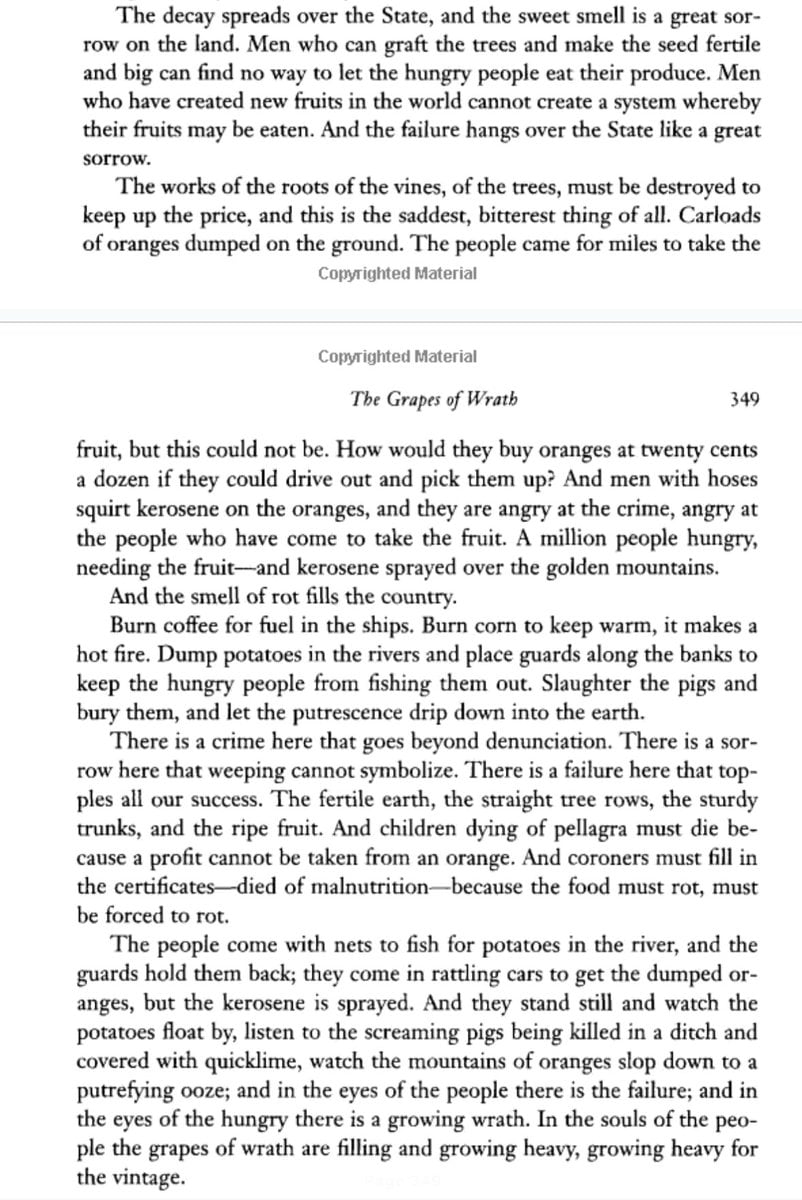During the Great Depression the federal government literally paid farmers to not harvest crops because allowing that much food to be produced would dilute the market and bring down crop prices.
During the Great Depression.
A time when people were starving and there were virtually no forms of welfare.
When millions were thrust into poverty for reasons entirely out of their control.
The federal government paid farmers to create less food to protect profit margins.
Farmers have bills to pay, too. If the price of growing food doesn’t cover the cost to make it they’ll go out of business. Then there will be one less farm to grow food. If there’s no farms and we’re totally reliant on imports, that’s a strategic weakness.
It’s the same reason we prop up carmakers when they go out of business: Manufacturing capacity is a strategic asset just like farmland.
Then subsidize the farmers by the amount you were paying them to not harvest the food ? They don’t make any money when they aren’t selling it at all either, without this intervention…
It, unfortunately, is an efficient distribution of labor, at least relative to other systems. Not because wasting food for profit isn’t fucking heinous, but because the mobility of investor capital and responsiveness of market prices is less inefficient than reciprocal economies or central planning.
However, we are at a point in human society where raw efficiency is no longer the bottleneck for our quality of life. Capitalism was an ugly solution to a real problem, but we can probably bid it farewell at this point, if only we can dislodge the elites who benefit from perpetuating it.
deleted by creator
Market socialism, ez. Shame about the whole “entrenched powers that be” bit.
Seems like you could get most of the way there by just keeping the current system but adding a social dividend which would form a basic income for everyone. If the dividend is pegged to economic growth then it should also be fairly resistant to inflation.
That goes beyond capitalism. People are just selfish. The hoarding of wealth was a thing way before capitalism. I think the left sort of shoots itself in the foot by obsessing over capitalism and ignoring the much deeper cause of a lot of societal ills. Being evil is part of human nature, just as much as being benevolent is.
It was rather radicalizing finding out that the world makes three times as many calories per person than is necessary to feed every person on this planet, but because we’re idiots living in a class society in the year 12024 HE, luxury restaurants regularly dump slightly subprime ingredients in the trash while thousands starve.
Existence is pain.

Easy there OP, do you think food is some kind of “human right” or something? Before you know it, people will be saying housing is too.
In 2021, the United Nations General Assembly passed a resolution that everyone has a right to food and the UN should work to eliminate world hunger. It passed 186 for and 2 against. The two countries that disagreed were the United States and Isreal.
Not to defend them, but that only makes them less hypocritical than others. Talk (and UN resolutions) are cheap, and most countries don’t guarantee food or shelter in practice. Finland is the only one that comes to mind as actually achieving this.
Edit: perhaps the downvoters would like to prove me wrong by providing their own examples?
Cuba pretty much manages to eliminate hunger and homelessness, as did the USSR and the entire soviet block
And at what cost? 30 years after the regime was changed, these countries are still significantly behind those who were capitalist in pretty much every single aspect.
You are correct that homelessness way tackled but hunger not at all. Take a look at Romania during Soviet era…
So whilst one problem was solved, many, many new arose. We didn’t have oranges (and other foreign goods) , considering our wages, everything was super expensive and personal growth was pretty much impossible - unless you became a member of the communist party, of course.
30 years after the regime was changed, these countries are still significantly behind those who were capitalist
How is that the fault of communism? The fact that half of Eastern-European countries have barely grown since the 90s is precisely the fault of capitalism at failing to raise the living standards and economies of those countries at rates similar to what communism achieved, except possibly in Poland and Czech Republic which have received capital investment in industry (ofc not high tech because that would compete against Germany) and grow at the expense of other countries through unequal exchange by relying on the import of cheap agricultural produce and raw materials.
I don’t know much of Romania, but how can you blame communism for the fail of the last 30 years of capitalism?
Well, these countries are still behind precisely because of communism. When communism fell, they were significantly behind. Now we are still behind countries like germany, france, england but at least we are getting closer to them.
Funnily enough, if you compare prices of goods relative to the wages, we are in a significantly better situation now than we were during previous regime…
When communism fell, they were significantly behind
How do you think they compared before communism? By the time of the Russian revolution, England, Germany and to a lesser extent France were the colonial and industrial powers of earth, with England having more than 100 years of industrialization and Germany more than 50. That’s orders of magnitude more rich and developed than Estonia, Ukraine, Czechoslovakia or Poland at the time.
All the growth from 1920 to 1990 (or 1940 to 1990 for countries that joined communism in the WW2 or after), was carried out in an economy without exploiting third countries. What modern Russia, Ukraine, Belarus, Estonia, Uzbekistan, Czech Republic, and Yugoslavia gained until 1990, was completely free of colonialism, it was through the sheer effort of the workers in those countries. If you compare that to the growth of England, France, Spain, or Germany in that century, their growth is so by engaging in either colonialism, of unequal exchange afterwards, i.e. exploiting the resources and labour or third countries (big chunk of Asia, most of Africa, and most of Latin America). Importing cheap agricultural produce and raw materials at bargain prices at the expense of the workers of the exploited countries, and reselling manufactured and otherwise high value added products at a premium capable of subsidising the rising working rights gained through unionization and labor movements (so, despite capitalism, and not because of it).
If you look at what happened since the 2000s, these formerly world-hegemon countries like France, England or Germany, simply have fallen behind. The GDP per capita of these countries barely has changed since 2008, which is about a decade and a half of stagnation. Capitalism working wonderfully, I see.
So basically you’re forgetting about the advantage that western and central Europe already had at the beginning and at the mid of the 20th century when comparing those countries’ levels of wealth and development becsuse of colonialism and industrialization. You’re forgetting that they kept doing the exact same exploitative behaviours in their process of growth. You’re forgetting that the improvements of the quality of life were done by workers fighting capitalism in unions. And you’re forgetting that these same countries have been stagnant for the most part of the two last decades.
There is a very logical progression of basic human needs. Without oxygen, a human will die in less than an hour. We need clean breathable air. Without water, a human a will die in less than a month. We need clean drinkable water. Without food a human will die in less than a year. Shelter is trickier because people can die of exposure and hypothermia in a matter of hours, but may be able to survive without it.
- Air for profit
- Water for profit <- This exists
- Food for profit <- We are here
- Shelter for profit
Minor correction: You’re technically right, but you will die in less than a week without water and less than a month without food.

You win Lemmy today. Yesterday? I need to read this book.
Yeah I don’t think talking about food production and distribution is a good method to promote socialism given how many people starved in socialist countries.
Seems to me this would be a subject socialists would want to avoid.








